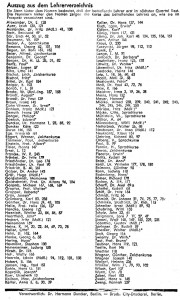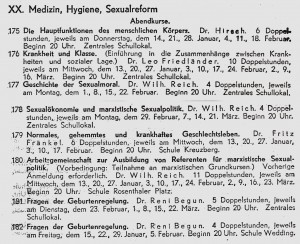by Andreas Peglau[1]

Figure 1. The Schickler House on Litten Street, a few hundred metres from the Berlin Alexanderplatz. The MASCH headquarters took up an entire floor here, where Wilhelm Reich, among others, held lectures. (Photo Gudrun Peters 2007)
Initiated by the KPD in Berlin in 1925/26, the founding of MASCH marked the beginning of an educational project that was in many respects unique and unjustly almost forgotten.The aim of the MASCH was to provide workers with education, above all basic knowledge of Marxism, which was also claimed to be infallible: „No social question that Marxism cannot answer, […] no political situation that Marxism cannot shed light on“ (Gerhard-Sonnenberg 1976, p. 73). The opponents or competitors were seen as „the bourgeois and socialist so-called ‚universities'“.
Apparently, the MASCH was quite successful in comparison to them; at least the SPD-affiliated universities were probably not used to the same extent by the Berlin population (Glaessner 1989, p. 267). The latter was met with a negative response from representatives of the Social Democrats, who held governmental responsibility in Germany until 1930 and in Prussia until 1932:
„Worried about the ‚purely numerical successes‘ of the MASCH, Leo Friedjung recommended in the monthly journal of the Reich Committee for Socialist Educational Work to ‚draw the necessary conclusions for […] the own training of party comrades and those sympathising with the movement‘, because ‚thousands of young workers go through the courses of the MASCH and are trained there in the sense of the Comintern’s instructions, thousands of new propagandists are bred here'“ (Wollenberg n.d.).
The Marxist Workers‘ School, however, apparently proceeded quite undogmatically in its practical work. Even in its subtitle it described itself as „the college of the working people“. It was also intensively used by members of other social groups such as the „intelligentsia“, and apparently no one was excluded because they belonged to the „bourgeoisie“ (Gerhard-Sonnenberg 1976, pp. 81, 154). Sometimes even „representatives of opposing views“ were specifically invited. An „internal report“ from 1927/28 stated that three quarters of the listeners were non-party (Krinn 2007, p. 459).
The MASCH concept quickly expanded into a „left“ people’s university; the number of listeners rose from 25 (1925) to more than 5,000 (1931/32) per quarter, the number of lecturers to 160 (Gerhard-Sonnenberg 1976, p. 80f.). Sometimes 700 listeners came to a single evening lecture. In the winter semester 1929/30 alone, 613 evening lectures were held, and in 1932 there were about 2,000 courses. Both the technical staff and the teaching staff worked free of charge (ibid., p. 76f.). Some of the lecturers were neither KPD members nor otherwise party-affiliated. The decisive criterion for acceptance as a MASCH teacher had increasingly become: „Are you also against fascism?“ (ibid., p. 154). The 1932 January issue of the MASCH journal Der Marxist was emblazoned with the slogan: „Against the Nazi theories!“
Among the speakers were the architects Bruno Taut and Walter Gropius, the director Erwin Piscator, the actress Helene Weigel, the photographic artist John Heartfield, the writers Egon Erwin Kisch, Erich Weinert, Ludwig Renn and Anna Seghers, the doctor and writer Friedrich Wolf, the composer Hanns Eisler, the physicist Albert Einstein, the jurist Felix Halle, the sociologist Karl August Wittfogel as well as prominent theoreticians and practitioners of communist politics such as Franz Dahlem, Hermann Duncker, Fritz Heckert, Edwin Hörnle, Alfred Kurella, Jürgen Kuczynski, Willi Münzenberg, Theodor Neubauer and Ernst Schneller.
In addition to Wilhelm Reich, the psychotherapists were represented, among others, by two other „left-wing Freudians“ – Barbara Lantos and Annie Reich – by the later „father“ of Gestalt therapy Fritz Perls and by the communist and individual psychologist Manès Sperber (Gerhard-Sonnenberg 1976, pp. 195f.; Bocian 2007, pp. 276ff.; Patka/Stančić 2005, pp. 52f., 186). Artists such as Bertolt Brecht and Kurt Weill supported the MASCH by making their flats available after the SA destroyed several lecture rooms in 1931 (Gerhard- Sonnenberg 1976, p. 75). The director of the MASCH was Anna Seghers‘ husband, Johann-Lorenz Schmidt.
Besides Marxism there were diverse course topics included social and communal politics, law, culture, the arts, literature, film, radio, photography, theatre, music, natural sciences (Einstein spoke about „What the worker needs to know about the theory of relativity“), medicine, sport, sexuality, children, education, the Soviet Union, foreign languages (including Chinese, Japanese and Esperanto), psychoanalysis and individual psychology, rhetoric, librarianship, typing, spelling and grammar, arithmetic, and problems of women and youth. Fascism in its Italian and German manifestations was also analysed again and again (ibid., pp. 124, 136, 172). Slide shows, tours of museums, exhibitions, factories or Magnus Hirschfeld’s Institute for Sexual Research complemented the programme.
Reich and his sexual economy fitted well into this context. Gabriele Gerhard-Sonnenberg (ibid., p. 127) explains:
„In the field of natural sciences and medicine, the well-known Marxist psychoanalyst Wilhelm Reich could be won for the courses ‚Marxism and Psychology‘ and ‚The History of Sexual Morality‘. He also led a working group for the training of speakers for Marxist sexual politics, for which, however, participation in Marxist basic courses was necessary.“
The rapidity with which Reich found a connection here is evidenced by announcements in KPD or KPD-affiliated newspapers.
On February 23, 1931, the KPD’s central organ Rote Fahne announced the beginning of the course „Psychoanalysis and Marxism. 4 evenings: Dr. Reich.“ The location was the then central training center at Gartenstraße 25 in what is now the area Berlin-Mitte (Berlin-Center).
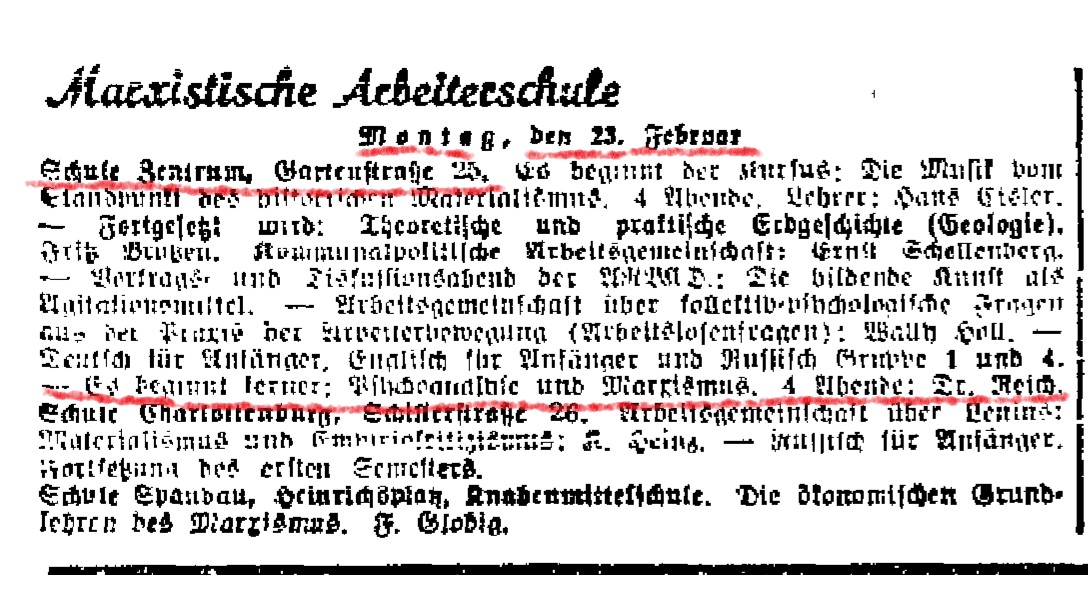
Figure 3: Reichs first lecture at the MASCH
On 8 March 1931, the Rote Fahne referred to the course „Psychoanalysis and Marxism: Dr. Reich“ which was continued at the MASCH. The same could be read in the Welt am Abend on 9.3.1931. On 11.4.1931 the Rote Fahne announced under the headline „Marxist Sexual Politics“:
„Dr. Wilhelm Reich, the author of numerous writings on sexual theory, the former director of the Vienna Sexual Counselling Centre, will begin his series of lectures on Marxist sexual economy and sexual politics on Monday, April 13, in the evening, at 8 p.m. sharp, in the central schoolroom of the Marxist Workers‘ School, Gartenstrasse 25, at the Stettiner Bahnhof. […] Dr. Wilhelm Reich’s lectures are sure to arouse special interest. Listening fee members of proletarian organisations 30 Pf. [pennies], unemployed 20 Pf., otherwise 50 Pf.“
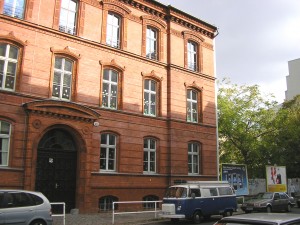
Figure 4. In 1931, the courtyard of this school complex in Gartenstraße (Berlin-Mitte) was still home to the central MASCH training centre. It was destroyed in the Second World War.
Possibly this announcement contains the first public mention of Reich’s neologism „sexual economy“ in the sense of a theory he developed that combined aspects of psychoanalysis and Marxism into something new. At the same time, however, he continued to use the term in the Freudian sense. Freud had often spoken of „economic“ relationships in the soul, referring to the energetic interactions of soul entities such as ego, id and superego (cf. Nagera 1974, pp. 348-354).
On 13.4.1931 Reich was mentioned as the „author of numerous well-known works“ when the KPD central organ again referred to its series of events in the MASCH.
The expectation expressed by the Rote Fahne that Reich’s course was likely to meet with special interest seems to have been justified. Reich wrote (and this is almost all that can be learned from him himself about his MASCH activities):
„The Marxist Workers‘ School […] held courses on the subjects of ‚Marxism and Psychology‘ and ‚Sexuology‘. In the summer semester of 1931 I held the first course in a school in Gartenstraße, and the second in the autumn. The number of participants increased from lesson to lesson. In the sexology course it reached the height of 250 listeners from all classes. In the first course, which was more difficult, there were political functionaries, students, teachers, etc. There were about 80 to 100. My writings were spread out throughout the whole Reich through the MASCH apparatus“ (Reich 1995, p. 153).
In the MASCH programme booklet for the winter term 1931/32, Reich’s „History of Sexual Morality“ (presumably the continuation of the „Sexuology Course“) was listed as lasting four double lessons. The „more difficult“ course also seems to have been continued: The programme recorded eleven double lessons led by Reich within the „Working Group for the Training of Speakers for Marxist Sexual Politics“. For this, „participation in Marxist basic courses“ was required as a „precondition“ (MASCH programme booklet 1931/32, p. 15f., in LA A Pr.Br.Rep. 030/95/21756).
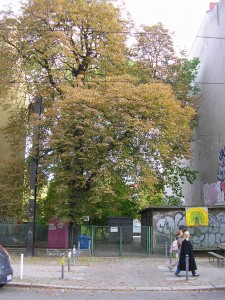
Figure 7. Here, at Kastanienallee 63, was the training venue listed in the programme booklet as „Rosenthaler Platz“ for security reasons: a restaurant belonging to the „Fichte“ sports club. It was also destroyed during the war.
Since similarly high numbers of listeners are also given for other MASCH courses (Kinner/Müller 1976, p. 5; Gerhard-Sonnenberg 1976, pp. 125, 173), Reich’s above reports seem credible. And as for the „MASCH apparatus“ having a nationwide effect: this formulation is also not exaggerated. MASCH teaching rooms were scattered all over Berlin; from 1932 onwards, not only was the MASCH headquarters located in the middle of Berlin’s city centre, in the prestigious Schickler building, but also the library, comprising two large rooms, which was used intensively (ibid., p. 116).
Distance learning courses were set up, teaching material for self-study was published and sent out (ibid., p. 112). And the MASCH concept expanded rapidly: by 1932 there were MASCH branches coordinated and guided by the Berlin MASCH in 36 large German cities as well as numerous branches in small towns. New MASCHs were founded in Zurich, Vienna and Amsterdam, and preparations were made for London, among other places (ibid., p. 95; Kinner/Müller 1976, p. 10f.).
It is therefore plausible that Reich’s writings were effectively passed on to receptive readers. Among other things, these were probably the writings that the KPD also included in its internal distribution: Der Einbruch der Sexualmoral, Der sexuelle Kampf der Jugend, Sexualerregung und Sexualbefriedigung as well as Annie Reich’s Wenn dein Kind dich fragt and Das Kreidedreieck, also a – probably collectively produced – educational brochure (Reich 1995, p. 167f.).
As early as 1931, Reich was counted among the „best teachers“ of the MASCH (Der Marxist 1971) and was included in the editorial board of the MASCH publication.
The fact that Reich attracted and captivated larger audiences was probably the reason for having him organise one of the rare „discussion evenings“ in the large lecture hall of the MASCH, which held 700 guests, to which „representatives of opposing views were also invited“. On 4 March 1932 he was to speak here on the topic of „Capitalist and Socialist Sexual Politics“ (MASCH Programme 1931/32, p. 21) – but this was then postponed until April because the speaker was „prevented from attending“ (Berlin am Morgen, 4 March 1932).
Since Reich taught at the MASCH at least until November 1932 (on 31 October 1932 he began a course on „Marxism and Psychoanalysis“ with five double lessons), he was able to present his views in detail to several thousand people from the „left“ democratic spectrum, including several „multipliers“, and make them available to an even larger number in printed form.
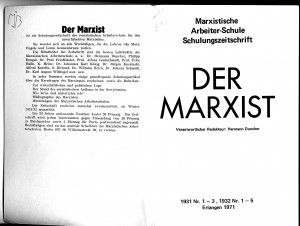
Figure 8. The Journal Der Marxist, on which Hermann Duncker, Felix Halle and Jürgen Kuczynski, among others, collaborated (reprint 1971). Reich is mentioned on the top left.
The friendly relationship that developed between him and Manès Sperber, who also worked as a MASCH lecturer, enabled Reich to make an additional public impact: within the framework of the KPD-affiliated „Arbeitsgemeinschaft marxistischer Sozialarbeiter“ (Working Group of Marxist Social Workers), the two discussed „The Sexual Question in Bourgeois Society“ in front of 300 and 400 listeners on 18 January and 1 February 1933, but possibly also before.
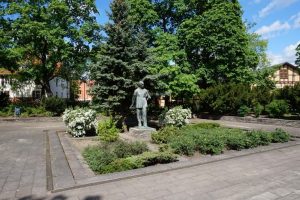
Figure 9. One of the few places that still commemorate the MASCH: Hermann Duncker Monument at Karlshorst S-Bahn station, on the former Hermann Duncker Strasse, now Treskow Allee (Photo: A. Peglau 2015)
It can be assumed that Reich’s conflicts with the KPD leadership put an end to his teaching activities in January 1933 at the latest. In February 1933, in one of the last MASCH programme booklets, he was then no longer listed as a lecturer.
As early as 1932, the MASCH had increasingly become the target of state repression. On 25 November 1932, the central building was occupied by the „Schupo“ (Schutzpolizei) and the „political police“, several people were arrested, and the teachers‘ register was confiscated. House searches of lecturers followed (Gerhard-Sonnenberg 1976, p. 141). In the spring of 1933, the National Socialists dissolved the Marxist Workers‘ Schools.
Bertolt Brecht was probably also one of Reich’s MASCH listeners. Brecht had already worked through Reich’s essay Dialectical Materialism and Psychoanalysis in 1930 (documented in Johler 2007, p. 170). Once in Berlin, Brecht attended MASCH classes. In the first half of the 1930s, he and his partner Helene Weigel were in loose contact with some members of Reich’s Scandinavian Sex-Pol group (Rothländer 2010, p. 117f.).
In 1942, long since in (now US) exile, Brecht remembered Reich: in his own typescript of the Refugee Talks he referred to him once again. Under the sentence, probably aimed at psychoanalysis, „For a time, the intellectuals were also glad to have a competing theory in the face of the Marxists‘ intensely boring proofs that the economic determines everything, after the sexual determines everything“, Brecht wrote in his hand: „W. Reich father-complex of the S.P.D.“ (Brecht Archive Berlin 161/25). This perhaps referred to a reflection also found in Ossip Flechtheim:
„Yes, just as in the family the daughter (and even more often the son!) may rebel against mother or father, but in doing so remains determined throughout her life, albeit negatively, by the parent against whom she rebels, so too the later KPD never quite gets rid of the ‚father or mother complex'“ (Flechtheim 1976, p. 289).
However, since not only had the KPD emerged from the SPD in 1919, but the SPD itself in turn grew out of a movement in the 19th century that „originally called itself communist“ (ibid., p. 77), there were manifold „parent-child“ entanglements here. It is possible that Reich had also referred to similar things in his MASCH lectures.
Reich, however, was to gain far greater influence than in the MASCH in another organisation close to the CP: the „Unified Associations for Proletarian Sexual Reform and Maternity Protection“, later subsumed by Reich under the term „Sex-Pol“.
***
[1] Abridged and translated excerpt from „Unpolitische Wissenschaft? Wilhelm Reich und die Psychoanalyse im Nationalsozialismus,“, 2017, pp. 99-106.
Please cite as: Peglau, Andreas (2023): Reich at the Marxist Workers‘ School MASCH (https://andreas-peglau-psychoanalyse.de/reich-at-the-marxist-workers-school-masch/).
As to the sources used in this text, please look below.
Please note: My English skills are not very good. Therefore, I first translated the text with DeepL and then corrected it. I expect that there are still translation errors – and ask those who discover such errors to send a message to info@andreas-peglau-psychoanalyse.de
The forwarding and distribution of this text for non-commercial purposes is expressly desired.
Here you can download the above article as pdf.

Andreas Peglau: Unpolitische Wissenschaft? Wilhelm Reich und die Psychoanalyse im Nationalsozialismus.
With a foreword by Helmut Dahmer and a detailed appendix of documents.
3rd, corrected and expanded edition 2017, Psychosozial-Verlag Gießen. 680 pages, softcover, 49.90 euros.
ISBN 978-3-8379-2637-8
https://www.psychosozial-verlag.de/2637
Also available as e-book:
https://www.psychosozial-verlag.de/7289
Here you can find the book’s table of contents, preface and index of persons. The complete list of sources and references of the book „Unpolitical Science?“ including all sources used in the following text can be read here : https://andreas-peglau-psychoanalyse.de/wp-content/uploads/2019/06/Quellen-und-Literatur-Peglau-Unpolitische-Wissenschaft-Wilhelm-Reich-und-die-Psychoanalyse-im-Nationalsozialismus-Psychosozial-Verlag-Gie%C3%9Fen-2017.pdf.

